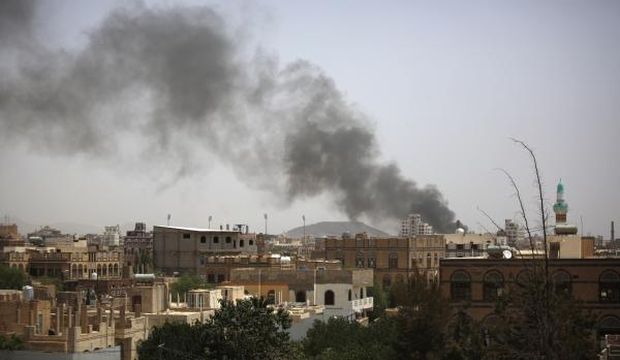
Smoke rises after a Saudi-led airstrike in Sana’a, Yemen, on July 10, 2015. (AP Photo/Hani Mohammed)
Riyadh and Sana’a, Asharq Al-Awsat—Yemen’s internationally recognized government will in the coming days present evidence to the United Nations regarding crimes committed by Houthi rebels in the country immediately after the start of a UN-declared truce on Friday evening.
Speaking to Asharq Al-Awsat via telephone on Saturday, Yemen’s Foreign Minister Riyadh Yassin said the government will send a message would to UN Secretary General Ban Ki-moon and the UN Security Council informing them of “massacres” carried out by the group against civilians during Friday evening and the early hours of Saturday.
The message will contain evidence showing that the Houthis shelled civilian areas in the cities of Aden and Taiz using Katyusha rockets.
The attacks began almost immediately after the start of the ceasefire, Yassin said, adding that the government has received reports that local hospitals had been inundated with dead and injured following the attacks.
Local eyewitnesses from Taiz told Asharq Al-Awsat attacks by the Houthis began on Friday evening, just as the ceasefire was meant to go into effect.
The sources said this was immediately followed by airstrikes carried out by the Saudi-led coalition targeting the Houthis in Yemen.
The coalition said in a statement on Saturday it had not received any request from Yemen’s government to halt the strikes.
Meanwhile, Yassin said the government had not received confirmation from the UN that the Houthis would accept the conditions of the ceasefire and that the UN had simply gone ahead and declared the ceasefire without also receiving confirmation from the government.
Yemen’s President Abd Rabbuh Mansur Hadi had days earlier sent a message to the UN secretary general which contained conditions for the government’s acceptance of a ceasefire with the Houthis, Yassin said.
The conditions included the government’s receiving confirmation from the UN that the Iran-backed Houthis had indeed accepted the ceasefire and the other conditions set by the government. These comprise the group’s ceasing hostile action against civilians and withdrawing from areas under its control—as well as allowing the delivery of humanitarian aid into those areas.
“But then we [the government] suddenly received a message [from the UN] announcing the ceasefire had been declared—and without any clear guarantees,” Yassin said.
Yassin maintained the government welcomed a humanitarian ceasefire in the country, but only under clear guarantees the Houthis would abide by the conditions.
“We insist that the ceasefire be a genuine one under certain rules and conditions, and without the rebels against legitimacy [the Houthis] exploiting the truce to redeploy their military units and block the delivery of humanitarian aid to those Yemenis most in need of it,” Yassin emphasized.
The government had previously requested UN Envoy to Yemen Ismail Ould Cheikh Ahmed to visit some of the areas in the country currently under Houthi control, especially in the south. Yassin said the government had evidence the group was not only shelling civilians but also blocking the delivery of humanitarian aid—subsequently seizing it for themselves.
Yassin said the government was in direct and continuous contact with the leadership of the Saudi-led coalition. He said the airstrikes were targeting Houthi positions only and that the coalition was not obstructing the delivery of humanitarian aid.
“The aid can really enter any place in Yemen—but only if this is allowed by the Houthis and the followers of Ali Abdullah Saleh,” he said. Yemen’s government, Saudi Arabia, and the UN all accuse Saleh—Yemen’s ousted former president—of aiding the Houthi rebels in Yemen.
Yemeni Political sources speaking to Asharq Al-Awsat said they regarded the breaking of the ceasefire as “another failure” for UN envoy Ould Cheikh Ahmed, following last month’s breakdown in UN-sponsored talks between the government and the Houthis in Geneva.
“The Houthis have broken the ceasefire, despite saying they had agreed to it. There is obviously a conflicting position here from . . . the Houthis and forces loyal to Saleh, as several large military units were deployed to Taiz and [the central province of] Ma’rib only hours before the ceasefire began,” one source said.
A five-day humanitarian ceasefire was offered to the Houthis by the Saudi-led coalition in May, which the group agreed to. However, as soon as the ceasefire started Houthi militias once again began shelling civilian areas, and airstrikes by the coalition continued.
Saudi Arabia and its Arab allies began their campaign against the Houthis after the group staged a coup against President Hadi and his government in February. Hadi and Prime Minister Khaled Bahah, as well as other members of the cabinet, were placed under house arrest. The Houthis had occupied the capital Sana’a since the September 2014.
However, Hadi eventually escaped and fled to Saudi Arabia where he requested the Kingdom intervene with military action in order to restore the government.
Arafat Madabish contributed additional reporting from Sana’a.
